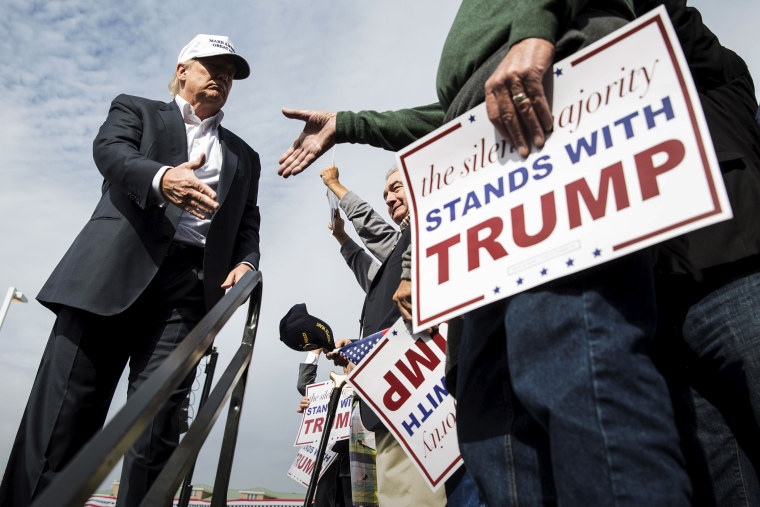Republican officials in Virginia have been toying with partisan "loyalty oaths" for quite a while. They're not improving with age.
In the 2000 cycle, Virginia Republicans originally tried to disseminate a form asking voters to pledge support for "all of the Republican Party's nominees in the next election." When state election officials balked, the Virginia GOP made voters in its primary promise not to participate in the primaries of any other party. Eight years later, Republican officials in the Commonwealth planned to push a loyalty pledge in their presidential primary, but abandoned the idea for fear of pushing away independent voters.
Four years ago, Virginia Republicans announced that in order to participate in their primary, voters would have to sign a form that read, "I, the undersigned, pledge that I intend to support the nominee of the Republican Party for president."
And in the current cycle, the Virginia GOP is pushing another pledge, though this one is shorter: those participating in the state's March 1 primary will be expected to sign a form that reads, "My signature below indicates that I am a Republican."
As the Washington Post reported, the Republican frontrunner isn't happy about this.
Donald Trump slammed the Republican Party of Virginia via Twitter on Sunday for its plan to require that 2016 primary voters sign a statement confirming they are Republicans. Trump and others say the requirement could discourage independent and first-time voters from casting primary ballots in Virginia, where primaries are open to all registered voters. According to some experts, the voter pledge has the potential to hurt Trump in particular, because his unorthodox candidacy has attracted voters disenchanted with traditional party politics.
Trump's tweet language can get a little garbled, but in one message published over the weekend, the candidate wrote, "It begins, Republican Party of Virginia, controlled by the RNC, is working hard to disallow independent, unaffiliated and new voters. BAD!" He added soon after the state party's approach is "stupid."
He has a point.
To be sure, these oaths have no force of law. A Virginia voter can sign the form, falsely claim to be a Republican, and face no punishment whatsoever. In fact, not only is there no enforcement mechanism, there's also no verification process -- Virginians don't register by party, so no one can know who is or isn't a Republican.
So why bother with the pledge at all? The intention is to discourage mischief -- party officials don't want their opponents interfering in their primaries with insincere motives -- without changing state law and overhauling the voter-registration process.
John Findlay, executive director of the state GOP, told the Richmond Times Dispatch the party's Central Committee had "a simple goal: to ensure Republican voters select our Republican nominee in 2016."
And while that seems persuasive, it's worth appreciating the fact that Virginia Republicans seem a little fickle when it comes to outreach. Eight years ago at this time, state GOP officials rejected the idea of a pledge because they wanted to welcome independents and conservative Democrats.
In December 2007, the then-state Republican chairman proudly declared, "It's a new day, and our job has to be to build the party. We welcome new people into the party."
So what happened to that attitude?
